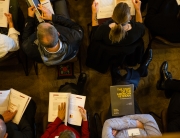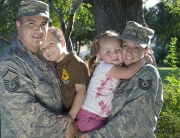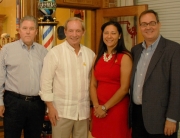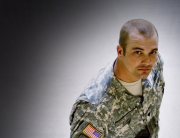The School of Social Work at the University of Southern California has been awarded two new grants totaling $6.5 million for its military social work and veteran services teaching and research activities.
In less than two years, the program has now attracted almost $10 million in funding, with Congresswoman Lucille Roybal-Allard playing a key role in facilitating the initiative’s growth and pointing out the need for comprehensive services for military members, veterans and their families.
Among other things, the awards will help fund a new virtual reality module that will expand the ability of educators to train a new generation of military social workers.
The first new award – a $3.3 million grant from the Lincy Foundation – will fund the school’s Center for Innovation and Research on Veterans and Military Families, supporting its start-up costs over three years.
The funds will also help develop faculty expertise, advance curriculum content appropriate to veterans’ needs, evaluate initial program implementation and provide emergency financial assistance for military social work graduate students.
A second $3.2 million award, from the Department of Defense, will help train more mental health professionals in evidence-based practices and military culture that will equip them to treat soldiers suffering from post-traumatic stress disorder and traumatic brain injury, and address the special needs of military spouses and children.
“I am extremely pleased to secure a second year of funding for USC’s military social work program to meet the mental health needs of our service men and women and their families, which is particularly important as soldiers experience longer deployments and service-related injuries that can be life-changing for them and their families,” said Roybal-Allard (D-Los Angeles), who helped secure the new DoD grant as well as the initial federal funding of $3.2 million to help create the initiative.
The school’s new immersive technology training effort will feature a programmed simulation with digital avatars that take on the personalities and experiences of real-life military personnel and their families.
This form of immersion technology, created in partnership with the USC Institute for Creative Technologies, has been used in the medical field for training purposes. This will be the first time its use will extend into social work.
“We want to revolutionize the way educators prepare mental health providers to work with military clients,” said Marilyn Flynn, dean of the school. “Our goal is to be the national leader in military social work education, research and partnership to advance the well-being of personnel, veterans and their families.”
The School of Social Work launched its military social work and veteran services master’s degree program in 2008 in response to a growing number of armed forces personnel experiencing mental health challenges that few professionals were prepared to treat.
Classes are now offered in Los Angeles, Irvine and San Diego. Students who select the specialization take military-themed core courses and their choice of electives in such areas as domestic violence, substance abuse, disabilities and family caregiving, and participate in internships in places such as veterans hospitals, veteran service organizations, community mental health centers and military-impacted schools near military bases.
USC is believed to be the first research university with a program aimed at preparing social workers and other trained mental health professionals to help the nation’s armed forces personnel, military veterans and their families manage the pressures of military life and post-war adjustments.
The program is quickly expanding: Fourteen students signed up for the military sub-concentration in 2009. For fall 2010, 85 of 400 eligible students enrolled in the military option.
Anthony Hassan, director of the school’s Center for Innovation and Research on Veterans and Military Families, said the initial prototype of the “virtual client” will be ready for beta testing in specially equipped classrooms on campus within six months. Within the next few years, users anywhere will be able to schedule online practice sessions with their avatar patients, he said.
“Through the support of many, the USC School of Social Work is aggressively working toward filling the gap in both capacity and competence of all mental health professionals who provide care to our nation’s wounded warriors and their families,” Hassan said. “USC is leading the way.”







